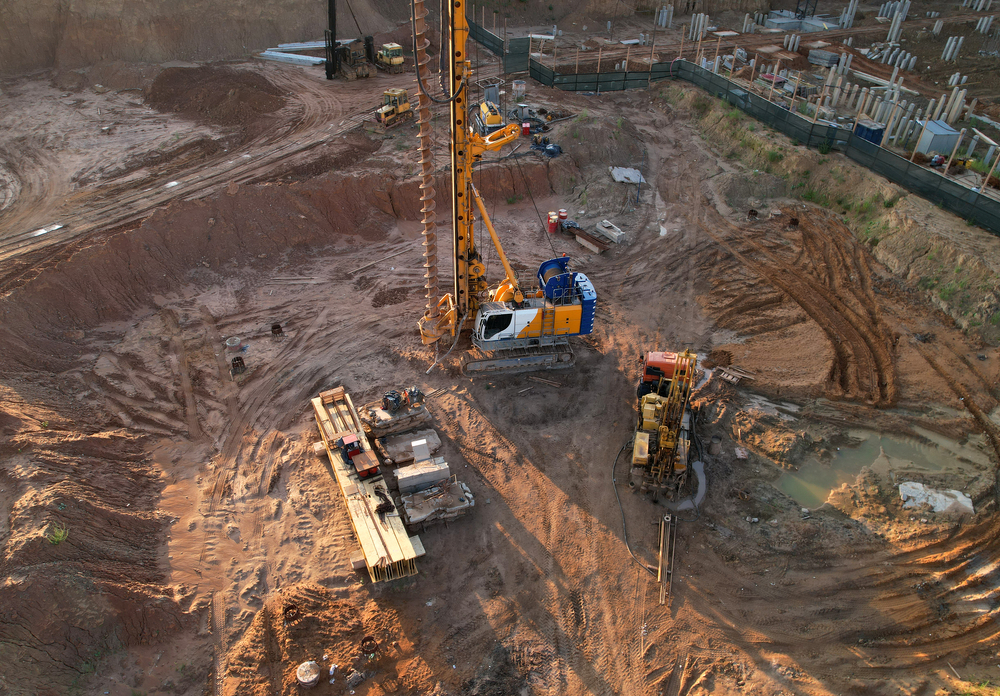Geotheta Fundamentals Explained
Geotheta Fundamentals Explained
Blog Article
Get This Report on Geotheta
Table of ContentsOur Geotheta PDFsHow Geotheta can Save You Time, Stress, and Money.The Best Guide To GeothetaGeotheta - An OverviewExcitement About Geotheta

They perform site investigations, gather examples, perform laboratory examinations, and assess information to assess the suitability of the ground for building projects - Engineer of Record. Based on their searchings for, geotechnical engineers supply referrals for structure layout, incline security, retaining structures, and mitigation of geotechnical risks. They work together with various other specialists, such as engineers, architectural designers, and building teams, to make sure that geotechnical factors to consider are incorporated right into the general task layout and execution
By analyzing the actions and residential or commercial properties of soil and rock, they can identify prospective geotechnical risks such as landslides, soil settlement, or incline instability. Their expertise aids protect against failings or crashes that might threaten lives and home. Right here are some comprehensive duties and obligations of a geotechnical engineer: Site Examination: Geotechnical designers conduct site examinations to gather information on subsurface problems.
They translate the information to comprehend the residential properties and actions of the dirt and rock, including their toughness, leaks in the structure, compaction characteristics, and groundwater problems. Geotechnical Evaluation and Layout: Geotechnical designers assess the information accumulated throughout website investigations to examine the stability and suitability of the site for building projects. They perform geotechnical calculations and modeling to evaluate factors such as birthing ability, negotiation, slope stability, lateral earth pressures, and groundwater circulation.
Not known Details About Geotheta
Foundation Layout: Geotechnical designers play an important duty in creating foundations that can securely support the intended framework. They evaluate the dirt problems and load demands to identify the ideal foundation kind, such as superficial structures (e.g., footings), deep foundations (e.g (https://my-store-fc66c1.creator-spring.com/)., heaps), or specialized methods like soil improvement. They consider factors such as negotiation limitations, bearing capacity, and soil-structure communication to create ideal foundation styles
They review building and construction strategies, monitor website activities, and conduct area assessments to validate that the style suggestions are complied with. If unexpected geotechnical issues emerge, they examine the situation and provide referrals for remediation or changes to the style. Risk Analysis and Mitigation: Geotechnical designers assess geotechnical risks and threats connected with the project website, such as landslides, liquefaction, or soil disintegration.

Collaboration and Interaction: Geotechnical designers work carefully with various other experts entailed in a project, such as engineers, structural designers, and building groups. Effective interaction and collaboration are necessary to incorporate geotechnical factors to consider right into the overall task style and building and construction process. Geotechnical engineers supply technological competence, response inquiries, and make certain that geotechnical requirements are satisfied.
See This Report about Geotheta
Right here are some sorts of geotechnical engineers: Foundation Designer: Structure designers specialize in developing and assessing structures for frameworks. They evaluate the soil problems, lots needs, and site qualities to figure out one of the most appropriate foundation type and design, such as superficial structures, deep structures, or specialized strategies like heap foundations.
They evaluate the elements influencing slope stability, such as soil homes, groundwater conditions, and incline geometry, and create approaches to avoid slope failings and reduce risks. Earthquake Engineer: Earthquake engineers specialize in analyzing and designing frameworks to withstand seismic forces. They assess the seismic threat of a website, review dirt liquefaction capacity, and develop seismic design criteria to make certain the safety and security and strength of structures during quakes.
They execute area testing, collect examples, and assess the accumulated data to characterize the soil buildings, geologic developments, and groundwater conditions at a site. Geotechnical Instrumentation Designer: Geotechnical instrumentation engineers focus on monitoring and gauging the actions of soil, rock, and structures. They install and keep instrumentation systems that keep an eye on elements such as soil negotiation, groundwater levels, incline movements, and structural variations to evaluate efficiency and offer early cautions of potential concerns.
The Buzz on Geotheta
They perform tests such as triaxial examinations, loan consolidation tests, straight shear examinations, and permeability tests to collect information for geotechnical analysis and style. Geosynthetics Designer: Geosynthetics designers specialize in the style and application of geosynthetic products, such as geotextiles, geogrids, and geomembranes. They use these materials to enhance dirt stability, strengthen inclines, provide drainage options, and control disintegration.
They have a tendency to be investigative individuals, which indicates they're intellectual, reflective, and analytical. They are interested, systematic, sensible, logical, and rational. Some of them are likewise social, indicating they're kind, generous, cooperative, individual, caring, helpful, empathetic, tactful, and pleasant - Geo Tech Engineer.
In the workplace atmosphere, geotechnical engineers utilize specialized software devices to execute estimations, produce styles, and analyze information. They prepare records, review project specifications, connect with customers and team members, and coordinate task tasks. The office setting gives a favorable environment for study, evaluation, and partnership with other specialists included in the project.
Geotheta Things To Know Before You Buy
They regularly go to task sites to carry out website investigations, assess geotechnical conditions, and collect data for evaluation. These gos to entail traveling to different areas, in some cases in remote or difficult terrains. Geotechnical engineers might carry out dirt tasting, conduct tests, and monitor building and construction tasks to make certain that the geotechnical elements of the task are being executed correctly.
Geotechnical designers likewise work in specialized geotechnical labs. In these centers, they conduct experiments, do examinations on dirt and rock samples, and evaluate the design residential properties of the products. Geotechnical laboratory engineers work extensively in these atmospheres, taking care of testing devices, operating instruments, and taping information. They team up with other lab personnel to make sure exact and dependable testing results.
Report this page